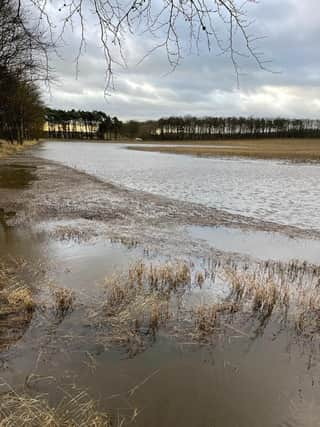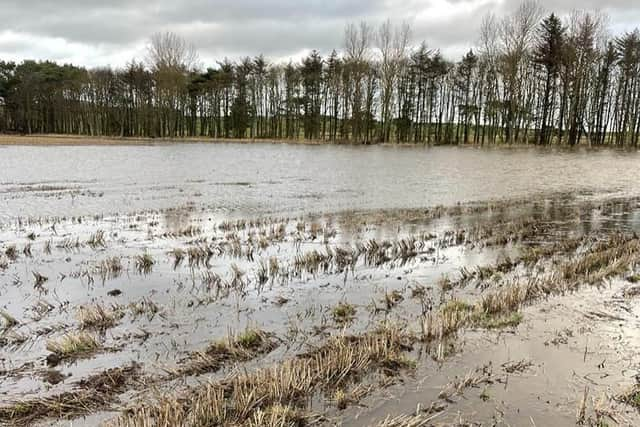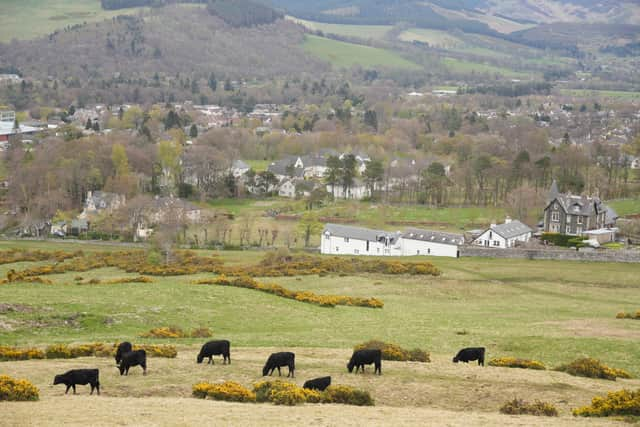How some of Scotland's farmers are showing the country needs a radical rethink in farming policy


Scotland’s farming policy needs a radical rethink, a regenerative farming consultant has said, as a handful of farms that have shifted to more regenerative practices are starting to bear fruit when it comes to land resilience in extreme weather.
The call comes as the Scottish Government passed the Agriculture Bill this week, with the next stage involving developing the post-Brexit four-tier subsidy scheme for farmers and crofters.
Advertisement
Hide AdAdvertisement
Hide AdThe National Farmers Union Scotland said it welcomed the Bill, and said many of what it has pressed for over the years is seen in the legislation.
But Angus farmer William Houstoun, who is a founding farmer of the European Alliance for Regenerative Agriculture (EARA), a lobbying organisation promoting the redesign of agricultural policy, said a radical rethink of farming policy is required if the country is going to produce food in more extreme weather patterns.


Speaking to The Scotsman, he said: “The changes that have been made in farming over my lifetime are coming home to roost.
“You can see it with the fields that haven’t been planted this year, the flooding that’s happening more and more often, and the waterlogged fields.”


Mr Houstoun spoke out after Britain’s wettest winter on record and unprecedented flooding left vast swathes of the British countryside under water.
He said: “Scotland is ready for this conversation. Having visited farms and National Parks all over the world, I realise how lucky we are in Scotland with our environment but looking around Angus I can see what a mess we are making of some of our farmland. Many fields, or parts of fields, will not grow any crop this year. We can only abuse the soil for so long.
“It is not too late to change.
“There is a way out of this mess and I can honestly say that the farmers who are genuinely regenerating their land are the happiest and most profitable I have met.”
Advertisement
Hide AdOne of those farmers is James Hopkinson, in Angus, who said the last two springs have been the best yet for some of his fields despite the extreme weather.
Advertisement
Hide Ad

The owner of Arable Ventures, which oversees four farms, changed from a “standard” approach to farming in 2017 to developing a more holistic, hybrid approach with a regenerative focus - and he has noticed a major difference.
The aim was to minimise tillage - the preparation of land before sewing crops - as much as possible to improve soil health.
So this meant removing ploughing - apart from in some cases where they still use it for potato crops - as this breaks up the soil which can impact its quality and build up of organic matter which is what it needs to absorb water.
He also makes sure to have a structured crop rotation, and “cover crops”, which are crops planted between spring and winter crops to ensure something is planted in the soil all the time - a key feature in soil health.
Mr Hopkinson said: “The proof is in the pudding because our crops look well, and we tend to be able to get on and drill crops when we want, when some neighbours haven’t been able to. It’s better for sure.
But the process has been gradual, Mr Hopkinson said.
“It takes time, for us it’s been about a ten year process, but we have seen big differences,” he said.
Advertisement
Hide Ad“We’re not completely chemical free or a complete no-tillage business.
“I wanted to be, but that was too big a risk as it’s a large arable business. There’s a middle ground, but we’re also taking a slow approach because if we don’t make money, then there’s no farm.”
Advertisement
Hide AdHe said in a lot of farming, he has noticed there is no resilience when it comes to the land.
“As weather patterns change, farmers for whatever reason are not changing their practices - it could be financial, lack of knowledge or awareness.
“It’s only been the last three or four years we’ve had some really stinking harvests and people really are starting to talk about the changes and these extremes.
“It’s difficult to make the changes, but you can.”
In the Scottish Borders, farmer Matt Griffin, who manages land for Neidpath Farms owner Matthew Benson, spoke about seeing similar, dramatic differences in land resilience when paying attention to soil health.
Mr Griffin previously told The Scotsman in fields that had been intensively farmed with about four per cent organic matter sat flooded for days. Meanwhile, a field that stopped being intensively farmed about four decades ago had 17 per cent organic matter and “its ability to hold water with that difference in organic matter and better soil structure is phenomenal,” he said.
Advertisement
Hide Ad

Farmers noticing the benefits of regenerative farming practices, including soil health, have questioned the Scottish Government’s decisions when it comes to spending millions of pounds on concrete flood defences - including the multimillion pound flood schemes in Brechin, Musselburgh and Dumfries.
Several have suggested funding should be diverted to farmers to assist them in improving soil structures to mitigate flooding.
In response, the Scottish Government said it is currently consulting on proposals for a national Flood Resilience Strategy, which is launched last month.
Advertisement
Hide AdA spokesperson said £42 million is invested each year, and an additional £150 million during this parliament, on flood defence measures, adding: “However, we recognise that we need to learn to adapt the places where we live and work to flooding.
“Ministers have been clear that we need to move away from thinking we can eradicate flood risk to a position where we are working across society to create flood resilient places.
“As such, we are currently consulting on proposals for a national Flood Resilience Strategy, which could include greater use of natural landforms and whole catchment measures and we would encourage farmers to contribute their views.”
Comments
Want to join the conversation? Please or to comment on this article.
